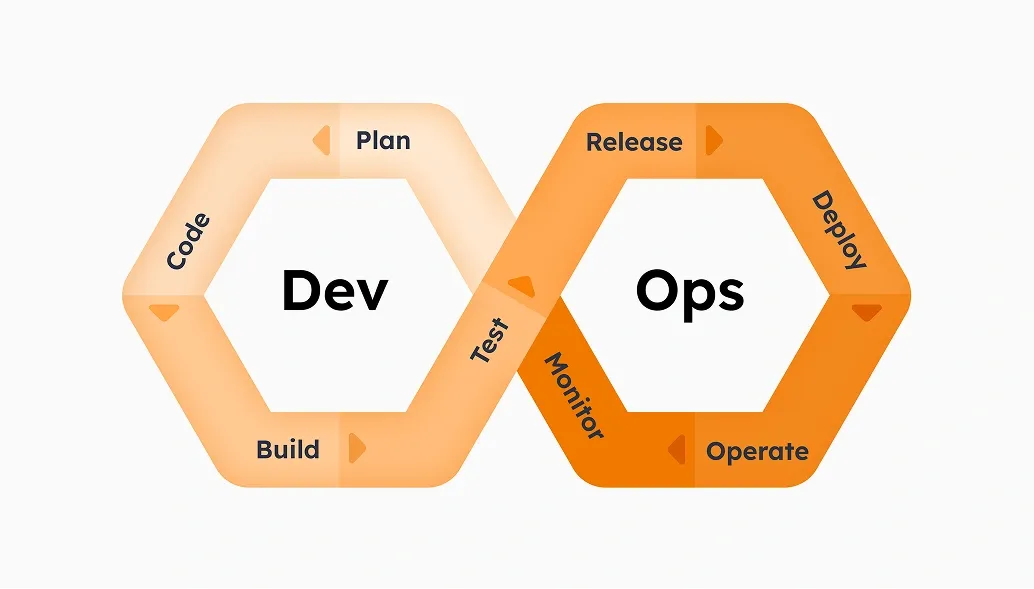
What is a DevOps engineer? Roles, responsibilities, and why they matter (in simple words)

Dmitry Bunas
Head of DevOps Department
The term DevOps was first used in 2009 during the DevOps Days conference in Ghent, Belgium. It emerged in response to the growing disconnect between development and operations teams, where developers wanted rapid feature releases, while operations prioritized system stability. Conference organizers, having experienced this tension firsthand during IT audits, envisioned a more collaborative approach, which now makes life better.
In this article, you’ll learn what a DevOps engineer does and why they are essential for building and running your ideal product.
Who is DevOps engineer?
DevOps engineer definition in simple words: “A person who helps developers and system administrators work together to ensure that new product versions are released quickly, smoothly, and without unnecessary stress”. Not to be confused with PM, who is responsible for planning, coordinating, and managing the development process, rather than the technical aspects of software delivery and support.
Imagine races. The driver (developer) focuses on driving fast (writing code), but without the pit crew, the car can’t run smoothly for long. What is a DevOps engineer here? They are the pit crew, which makes sure the tires are changed, the engine runs well, and everything is ready for the race (production). They work fast, use tools, and prevent problems so the driver can keep racing without stopping for too long.
Why are DevOps engineer roles critical to the business?
The product is a living mechanism. And DevOps knows how it works, where its weak points are, and how to make it run faster without overheating. Later, we’ll take a closer look at what a DevOps engineer does in detail, but for now, I’ll show you what every product loses if there’s no DevOps in the development strategy.
1. Technical debt
When infrastructure is not automated and documented, changes to the system are made manually, without control. If a team member departs, their knowledge also leaves. DevOps describes infrastructure as code, so that each element can be restored, preserved or scaled automatically, reducing risks and accelerating development.
2. Invisible downtime
QA checks the product before release. But once it’s live, who makes sure it keeps running smoothly? No one watches the system in real time, excluding DevOps. If something breaks, no one notices until users complain. Services crash and stay down. Traffic grows, but the system doesn’t scale. Problems pile up silently hurting user experience and business.
3. Slowed down time-to-market
Without automation, code deployment is manual, slow, and error-prone. Developers spend their time configuring servers, deployments, rollbacks, and environments instead of developing. Bugs slip through, and rollbacks take time. What is the role of a DevOps engineer? To streamline and automate these steps so updates ship faster, with fewer errors and less overhead.
4. Suffering security
Without a DevOps approach, security often becomes an afterthought. Developers focus on building features. System administrators focus on keeping systems running. And no one takes full responsibility for security across the entire pipeline from code to production: unified visibility, late security checks, no monitoring.
5. You're losing money
Every crash, delayed release, or undetected bug leads to direct financial loss. And the more users you have, the greater the impact. A DevOps engineer helps reduce these risks by making your product more stable, faster to update, and less reliant on manual processes, which means fewer failures and more revenue.
Do you want more precise information?
Our professionals will explain all DevOps engineers' roles and responsibilities at Modsen to you in a free personal consultation.
Paul Kirikov
Head of Business Development



DevOps engineer responsibilities for modern projects
Since DevOps is a team effort between development, operations, and testing, there’s no single tool. It’s more of a toolchain made up of multiple solutions. Now more details about the DevOps engineer role for your project.

1. Automation of development, testing and delivery processes
A DevOps engineer automates routine tasks. Instead of developers or testers doing everything by hand, DevOps sets up systems that automatically:
Combine new code with the main codebase (called code integration)
Run tests to check if the new code works (automated testing)
Deliver the working code to servers (deployment)
Quickly undo changes if something breaks (rollback).
2. Continuous integration and continuous delivery (CI/CD)
Another role of a DevOps engineer is CI/CD ensuring. It is an approach that helps get new code into the final product quickly and safely. It has two main parts:
Automatically checks that new code doesn’t break anything
Runs tests to make sure everything works correctly
Helps find errors early.
Continuous integration
Whenever developers write new code, it is automatically checked and added to the main shared system.
What CI does:
Deploys code to different environments (testing, production, etc.)
Does this quickly and without manual work
Monitors the process and sends alerts if something goes wrong.
Continuous delivery
Once the code passes all checks, it is automatically deployed (installed) on test or live servers.
What CD does:
3. Infrastructure management
If you ask, “What’s a DevOps engineer doing else” I would say they manage the technical “backbone” of the product: servers, databases, networks both in the cloud (like AWS, Azure) and on local servers. They make sure:
Servers are always available and stable
Systems can handle more users if needed (scaling)
Data is backed up and can be restored if something goes wrong.
Infrastructure as Code
Instead of configuring servers manually, DevOps engineers write code to describe the infrastructure setup. Through these files they can edit, test, and version. This lets teams create and update servers automatically, avoid manual errors, and instantly rebuild systems if needed.
Containerization
One more answer for “What is the work of a DevOps engineer” is containerization. DevOps packages apps into containers (like digital boxes with everything the app needs to run). This helps launch the app on any computer with the same results and avoid bugs that happen in one environment but not in another.
4. Microservices
Modern apps are often built from many small parts – microservices. So, another responsibility of a DevOps engineer is to work closely with microservices architecture. Each small part does one job and works on its own. If one fails, the rest keeps working, so your users aren’t affected. DevOps engineers help these services communicate, scale and run smoothly.
5. Security and compliance
What makes a good DevOps engineer is DevSecOps – a combination of development, security, and operations. Security is incorporated into the software at the outset instead of being added later, which can be expensive and time-consuming. This approach:
Scan code and servers for security risks before launch
Protect data and access to systems
Follow industry rules (like GDPR or ISO).
6. Monitoring and improving system performance
After releasing a new version of the software, our work continues. We constantly monitor systems and apps with smart tools to respond quickly to problems and prevent them by:
Fixing slowdowns and bottlenecks
Avoiding downtime and crashes
Quickly finding and fixing configuration or hardware issues
This keeps our services stable and reliable.
So, what are the roles and responsibilities of a DevOps engineer? From automation and infrastructure management to security, performance monitoring, and more.
DevOps engineer vs System administrator vs Software developer
For better clarity, here is a quick comparison table showing how the goals and responsibilities of a DevOps engineer compare to those of related roles.
Aspect | DevOps engineer | Software developer | System administrator |
|---|---|---|---|
Primary focus | Automation, integration, and reliability of the full software delivery lifecycle | Code and software logic | Maintaining and managing IT infrastructure and systems |
Key duties |
|
|
|
Goal | Deliver software quickly, reliably, and securely | Create software that solves business or user problems | Ensure uptime, performance, and security of infrastructure |
Previously, all DevOps engineer roles and responsibilities were handled by developers, but with the advent of a new philosophy, the division of tasks has shown better results for development.
The final thoughts
What should a DevOps engineer know? Good DevOps knows how to make code run. But more importantly, they make your business run with fewer delays, better structure, happier clients, and a team that’s actually proud of the process, removing blockers, preventing bugs at the handoff between teams, and turning fragile processes into resilient, repeatable systems. If you're interested in avoiding duct-taped releases, phantom bugs, and stalled team velocity, let's talk. Our DevOps team can help you build the kind of technical foundation that feels light to run, not heavy to carry.

Get a weekly dose of first-hand tech insights delivered directly to your inbox